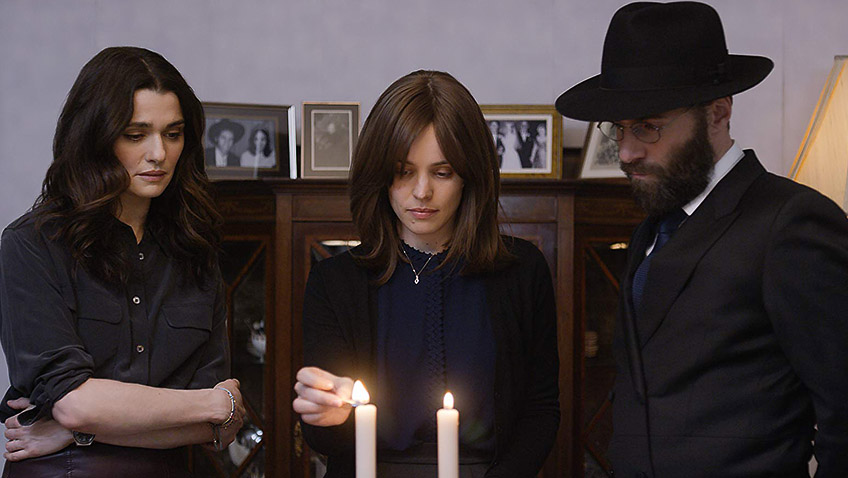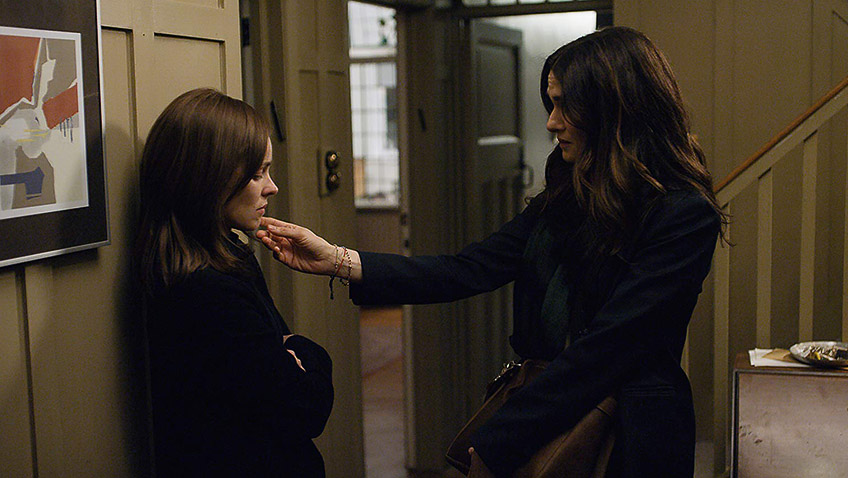Joyce Glasser reviews Disobedience (November 30, 2018), Cert. 15, 114 min.
Chilean-Argentine writer/director (and sometime editor/producer) Sebastián Lelio has a way with women. His fourth feature, Gloria, and his fifth A Fantastic Woman make heroines of women who find themselves alone on the margins of society, struggling to hold onto their dignity and identity. In the former an invisible 50-something divorced mother of two is ever the guest at someone else’s party; and in the latter, which won the 2017 Academy Award for best foreign language film, a Trans female, Marina, encounters prejudice and cruelty when the man she is living with dies, and his bourgeois family reclaim him. Disobedience, adapted by Lelio and Rebecca Lenkiewicz from Naomi Alderman’s novel
, is a more conventional and less emotionally engaging film than its two predecessors, a problem that could be related to a misguided adaptation. Intentionally or not, the centre of the film and the most interesting character is the central male character (Alessandro Nivola) who must examine the meaning of his faith when the two women in his life become lovers.
The revered Rav Krushka (Anton Lesser), a widower, has been ill, but his last sermon before collapsing in the Temple is, by any account, a curious one for Dovid Kuperman (Alessandro Nivola), the Rav’s bright, adoptive son whom the Rav has been grooming to take his place. Angels and beasts have no will, but, the Rav preaches, God ‘gave us a choice, which is a responsibility and a burden.’ The sermon will come to haunt and frustrate Dovid the humiliated husband; jeopardise the career of the Talmudic scholar, and enlighten a man raised to do the right thing.
When the Rav’s estranged only daughter Ronit (Rachel Weisz) shows up at the Kuperman residence where the community is sitting Shiva, Dovid is surprised and delighted, and Ronit is relieved to find a familiar, welcoming face. We do not at first know why, but it is clear from the stares and the guarded greetings in the room full of mourners that Ronit, a photographer who has been living in New York City, is tolerated for who father’s sake more than welcomed. She will be reproached for not being present to care for her father, but the resentment is much deeper. Her excuse that no one notified her is countered by an uncle who reminds Ronit that if she had not left, she would not have needed notification.
The pain and the guilt that emerges with the news of the Rav’s death are suggested in a short, not entirely successful, montage. She goes to a bar to get drunk, picks up a guy for a quickie, and stares into space on the flight from London to New York.
When Dovid and Ronit are briefly alone in his kitchen, they relax, but both realise that now, as adults, any physical contact, even the most innocent as an expression of warmth, is off limits. When Dovid surprises Ronit with the news that he is married she tries to find common ground with a joke about the identity of his bride. The ‘joke’ is on Ronit who is taken aback to learn that he has married their mutual childhood friend, Esti (Rachel McAdams, excellent).
Lelio lets us work out the dynamics of this uncomfortable situation and allows us to assume that Esti is jealous of Ronit, answering her childhood friend’s questions about their marriage succinctly and not entirely honestly. When Dovid insists that Ronit stay in their guest room, Esti dutifully makes the bed and brings up the towels.
At a dinner with friends and relatives, it is clear that Ronit is not only a misfit but is an outspoken one, countering questions about why she is not married with babies with a frankness that offends all the guest except Dovid and Esti. When a relative notes in a critical manner that Ronit has changed her name, she points out that artists often change their name. It is a turning point when quiet Esti speaks out, reminding the group that women change their names all the time – by taking their husband’s name.
The Orthodox community (the film was shot on location in Hendon and Stamford Hill, North London) is painted as a fairly homogenous group with all the clichés of a tight-knit, conservative group. They are, in a way, the equivalent of Marina’s boyfriend’s narrow-minded family in A Fantastic Woman, only this community’s views are not driven by financial gain, but rather by tradition as the determinant of what is right. This review contains ‘spoilers’ after this point, so readers be forewarned.
Half-way through the film the pace increases and while we never learn the exact circumstances that prompted Ronit to leave, it is clear that Ronit did not leave Dovid behind, but Esti. A passionless sex scene between Dovid and a frigid, compliant Esti is contrasted with a long, loving and passionate sex screen between Esti and Ronit when the two escape to London hotel one afternoon. So why didn’t Esti just move to London instead of marrying? The idea of free will returns when we understand that Esti’s ties to the community – where she enjoys teaching in a Jewish school– and her respect for Dovid prompted her to sacrifice her sexual happiness. Yet it is Esti who secretly notified Ronit of her father’s death in the hope that she would return.
Ronit’s character is like the mysterious gunman who comes into a passive western town and changes the lives of the inhabitants before leaving at dawn. Esti now sees that her compromise is too heavy a burden and she asks Dovid for her freedom just as he is honoured by the position of the new Rav, formally replacing Rav Krushka.
Esti’s request, and Dovid’s knowledge of her renewed relationship with Ronit present a personal and professional challenge to Dovid. His new prestigious position in the community, and his job for life would be compromised by a divorce let alone the lesbian scandal behind it. Whether it is because this is Lelio’s first film shot in English and in England with known English actors and an underlying source material that he did not write, the real story and emotion only emerges towards the end.
It is much more interesting looking at Disobedience as Dovid’s story and surely his character arch is the largest. If we feel for the miserable Esti during the obligatory sex act every Friday night, we never see Dovid’s point of view. Is he a passionless man, or just reacting to his wife, who admits to bi-sexual Ronit that she is a pure lesbian? Dovid, not Ronit, was present to hear the Rav’s sermon, and he has grappled with it as a scholar and leader until being forced to confront it as a man. Novola’s performance, which will bring tears to your eyes, should be considered when the winter supporting actor nominations are put forward.
You can watch the film trailer here:







